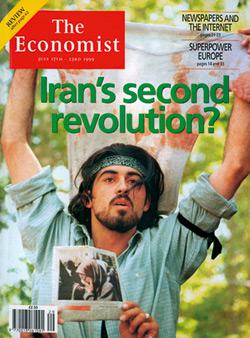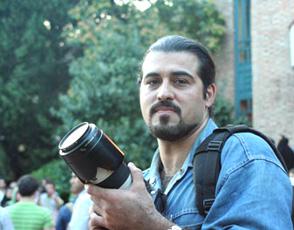 Vampire Weekend's Surprising Jewish Stories
Vampire Weekend's Surprising Jewish Stories


7 min read
Ahmad Batebi bears witness to a brutal, untrustworthy regime.
As world leaders negotiate a nuclear pact with Iran, many are concerned about the simple ability to trust Iran. It is said that the measure of a regime is how they treat their own people and – between Iran’s violent crackdown on dissidents, lack of civil liberties, and restricted access to information – the situation in Iran today is what Human Rights Watch calls "a crisis."
Ahmad Batebi has witnessed his share of abuse in Iran. At age 21, Batebi was imprisoned and tortured, becoming a global human rights icon before finally escaping in a spectacular journey worthy of James Bond.
Batebi, now age 37, met with Aish.com near his home in Washington DC, and shared his first-hand account of the extremist methods and motives of the Ayatolla's regime.
Stonings and Shootings
"One morning, when I was in fourth grade, the Revolutionary Guards came to our school," he says, referring to the feared Iranian force that protects both the country's Islamic Sharia law and its most sensitive military operations. "They dug a hole in the ground and buried a man up to his waist. In front of a large crowd, a religious cleric explained how Islamic Sharia law mandates his execution.
"The Revolutionary Guard then threw rocks – chunks of concrete the size of melons. The man's face was covered with a cloth, which was soon soaked red with blood. One piece of rock somehow broke off and hit me in the face, knocking me out. I was taken unconscious to a medical clinic. At age 9, that was the beginning of my opposition to the government."
 Batebi ended up at Tehran University studying photojournalism and film. In 1999, as thousands of students took part in anti-government protests, Batebi went to help some people who'd been injured. "We came under police fire," he recalls. "One bullet ricocheted off the wall, whizzed past my face, and hit my friend in the shoulder. I tried to stop the bleeding with a t-shirt."
Batebi ended up at Tehran University studying photojournalism and film. In 1999, as thousands of students took part in anti-government protests, Batebi went to help some people who'd been injured. "We came under police fire," he recalls. "One bullet ricocheted off the wall, whizzed past my face, and hit my friend in the shoulder. I tried to stop the bleeding with a t-shirt."
Batebi helped his friend get medical attention, then held up the bloody t-shirt to warn fellow students of the danger.
At that moment, a photographer snapped his photo which landed on the cover of the respected British publication, The Economist. Overnight, Batebi became a global hero – a symbol of Iran's student reform movement.
But in the eyes of the brutal Iranian regime, he was a marked man.
Batebi managed to escape Tehran, but the authorities traced him down. He was arrested and sent to Tehran's Evin prison, a hellish place run by the regime's secret police. Authorities demanded that he issue a statement declaring the bloody t-shirt to be a fake prop; they also demanded he "admit" to receiving money from the CIA and Israeli Mossad.
Batebi refused. "I was ready to die rather than participate in this game."
The Iranians did not respond kindly. They sent him to solitary confinement where he was hung by the wrists and denied sleep for 72 hours. They whipped him with cables and rubbed salt into the wounds – deep red scars he still bears today. They beat his testicles, kicked in his teeth, and dunked his head in excrement until he inhaled.
With this picture, you have signed your own death sentence.
Batebi's trial – for the crime of opposing the regime – lasted "a total of three minutes, with no lawyer and no jury." At the trial, the judge displayed the iconic photo – which Batebi had never seen before. "With this picture, you have signed your own death sentence," the judge told him.
Batebi describes the ensuing horror:
"After a while, I was brought to the gallows with other prisoners. They put a rope around my neck. They hanged the guy to my right. Then they hanged the guy to my left. When I saw their legs swinging in the air, I fainted on the spot. I thought I'd died. I wasn't convinced I was alive until the guard came to my cell with lunch."
For Batebi, worse of all was being forced to listen to recordings of what he was told was his mother being tortured. "I was hoping they'd kill me," he says, "just to end my agony."
After 8 years in prison subjected to various tortures and punctuated with hunger strikes, the burly Batebi suffered a stroke, seizures and a brief coma. At age 29, his life force was ebbing.
Yet the same photo that got Batebi into trouble also made him a cause celebre amongst Western human rights advocates. Due to his global profile, the regime didn't want to be blamed for him dying behind bars. He was sent to a hospital and kept under close guard.
At this time, an activist in Sweden had arranged with an Iraqi Kurdish group to help Batebi escape. And so, on the Persian new year, when the hospital guards were off-duty, Batebi snuck away, met his contacts in Tehran, and embarked on a harrowing escape, involving days of mule travel through minefields and sounds of gunfire from border guards. Passed from team to team of shadowy smugglers, Batebi eventually crossed Iran's northwestern border with Iraq – using a cellphone camera to record every step of the way.
 While in Iraq and plotting his next move, Batebi maintained a secret email account that he used to communicate with his sister back in Iran. One email – which included his cellphone number – was intercepted by Iranian agents. One night, as Batebi's cellphone rang, he was shocked to hear the familiar voice of an Iranian prison official. “We know where you are,” he said.
While in Iraq and plotting his next move, Batebi maintained a secret email account that he used to communicate with his sister back in Iran. One email – which included his cellphone number – was intercepted by Iranian agents. One night, as Batebi's cellphone rang, he was shocked to hear the familiar voice of an Iranian prison official. “We know where you are,” he said.
Fearing again for his life, Batebi gained the assistance of a human rights lawyer, who arranged for his entry into the United States on humanitarian grounds.
In what seemed like the blink of an eye, Batebi was settled into "a new life of self-confidence, respect, safety, equal opportunity and freedom." He shared his storied – and escape video – on CBS's 60 Minutes.
These days, Batebi continues to fight for human rights in Iran, while managing a Persian radio station and playing electric guitar. In 2008, he married an Iranian-American university student, now a research biologist at the National Institute of Health. His parents remain in Iran; he speaks with them occasionally on Skype, "though it is dangerous for them."
Batebi closely monitors the issue of Iran's nuclear program, and has views on how to stop the regime from obtaining nuclear weapons. "Rather than engage Iranian leaders, we should exclude them from the community of nations. At the same time we need to more actively support the Iranian people's quest for human rights. Knowing they have international support will give them the courage to take a public stand against the Iranian government."
And what of the Ayatollah's threats to annihilate the State of Israel?
 "The Ayatollah's brand of Islam has a huge problem with the Jews. In school, we were constantly told about the evil Jews. If Iran has a nuclear bomb, I believe they'd use it against Israel."
"The Ayatollah's brand of Islam has a huge problem with the Jews. In school, we were constantly told about the evil Jews. If Iran has a nuclear bomb, I believe they'd use it against Israel."
Meanwhile, the human rights situation in Iran further deteriorates, causing grave concern for the idea of "trusting Iran" as a negotiating partner. In 2011 the UN Human Rights Council appointed a Special Rapporteur on Iran in response to the worsening rights situation, but Iranian authorities have refused him access to the country.
What of the stolen years of his life and the trauma he still suffers today? "My spirit is injured," Batebi says. "I have trouble sleeping at night and I cannot tolerate noise. I have nightmares of my fellow prisoners whose torture I was forced to witness. Their cries for mercy still ring in my ears.
Yet Batebi is sanguine. "I am not angry. Although I suffered, I'm grateful to be alive and tell about it."
